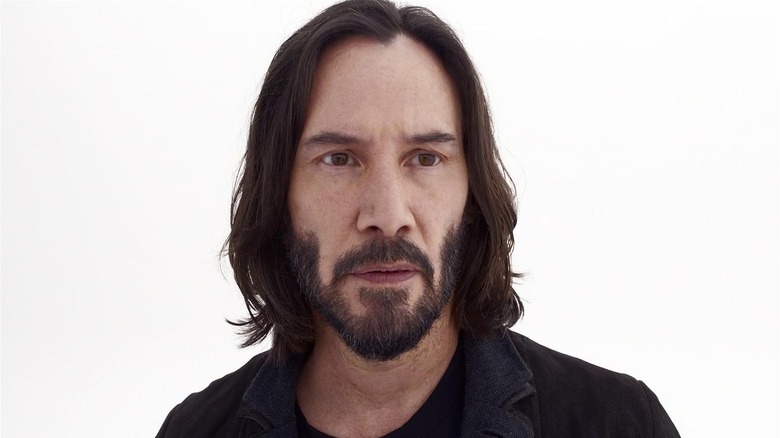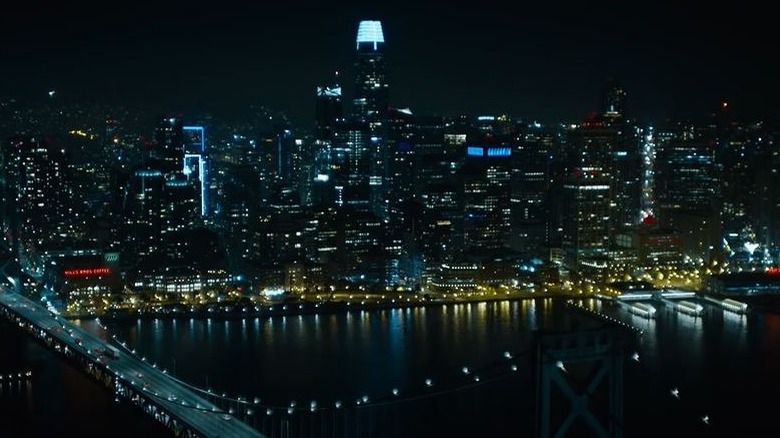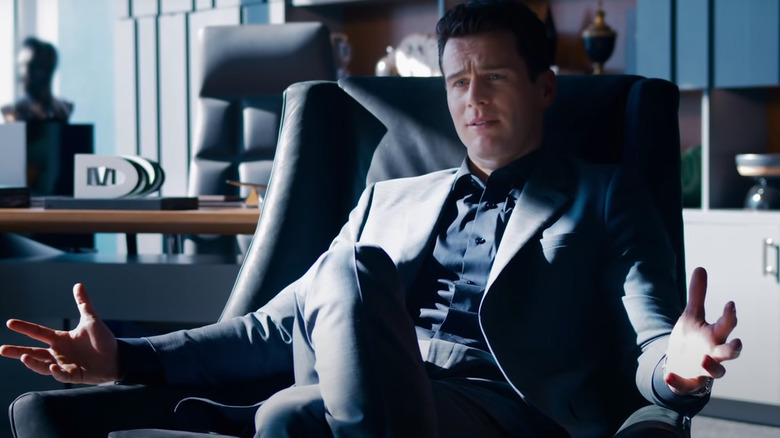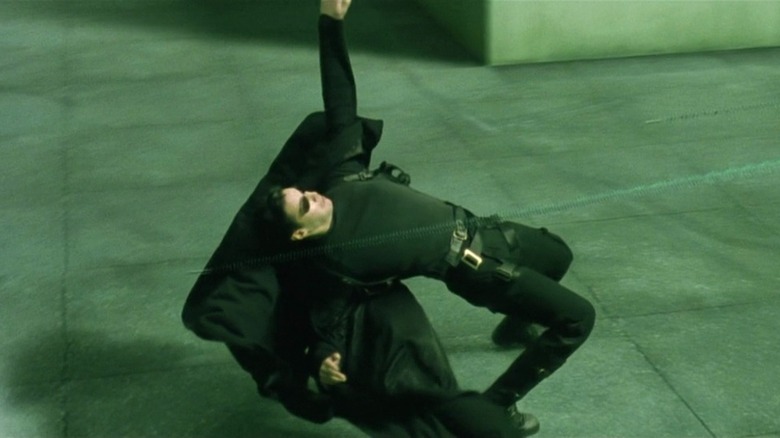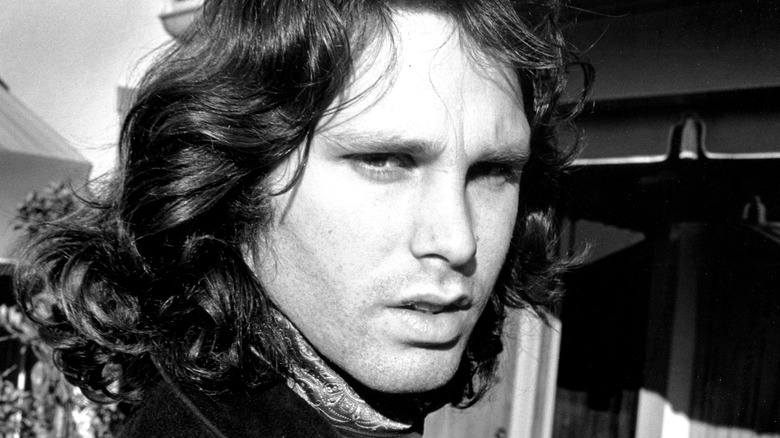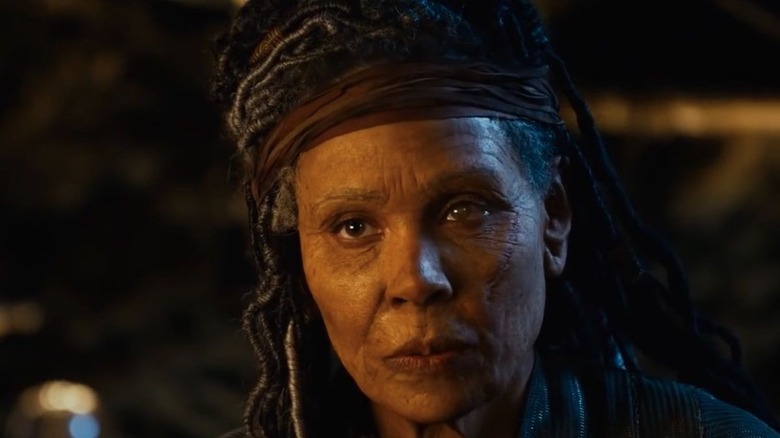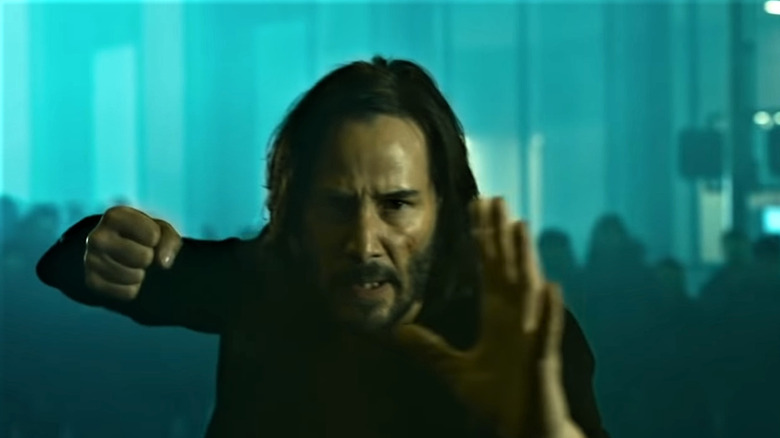Lines In The Matrix Resurrections That Mean More Than You Realize
"The Matrix Resurrections," like every "Matrix" movie, is full of layers. Many of those layers are explained via dialogue, including a lot of lines that mean more than first meets the eye ... or, well, ear. The trick is finding them.
Most of the meaningful lines in "The Matrix Resurrections" are telegraphed; We see an accompanying flashback from the original trilogy, or the lines are direct quotes. New Morpheus telling Thomas Anderson "go to the door at the end of the hall" isn't exactly subtle. Those who saw "Resurrections" in theaters may have also missed a bunch of dialogue, since parts of this film are absolute victims of the muddled audio mixing plague that's taken over Hollywood in recent years. Don't worry, though, most of that was technobabble.
Fear not, though: We've taken the time to identify lines that may matter more than you thought, and explain why they're so important.
Spoilers for "The Matrix Resurrections" follow.
I'm a geek. Raised by machines
Jude delivers this line while in the coffee shop with Neo. He's ostensibly talking about how he grew up playing video games, but it's clear that a line this blatant carries some extra meaning. Part of this line is smack-in-the-face obvious: He's a dude who lives in the Matrix. He was, literally, raised by machines.
What's less obvious, however, is how much it foreshadows Jude's true nature. When Bugs meets Neo, she tells him that his friend Jude is actually working with the Agents. Sure enough, Jude is on the lookout for Neo, which is more than a good enough reason for Neo to leave with Bugs. He wasn't just raised by machines as a human, but as a potential threat.
It's also possible that Jude's name means more than it seems. Much of "The Matrix" series is a Christ allegory, at its most blatantly obvious in "Revolutions" when a cross-shaped beam of energy expels from Neo after he sacrifices himself. As such, it's not a stretch to assume that "Jude" — the name of a man who betrays Neo — is derived from Judas.
That's the thing about stories – they never really end.
This line, said by Not-Agent Smith after telling Thomas Anderson that their company has been commissioned to make a fourth "Matrix" game, is obvious enough up front. "Resurrections" is a sequel to a long dormant series — both in real life and as a game in-universe — so of course the story never ended. This is true literally and metatextuality, given that this is in large part a "Matrix" movie about making "Matrix" movies.
What's easier to overlook, especially if you haven't seen the sequels in a while, is that it stands in direct opposition to what we heard in the third movie. Throughout "Revolutions," Neo is told multiple times — usually by the Oracle in some capacity — that "Everything that has a beginning has an end." More importantly, it's one of the last things Smith says to Neo. Now there's a new version of Smith, telling Neo the advice that's counter to that he was forced to give in his final appearance.
Bullet time
Multiple characters throughout "Resurrections" use the phrase "bullet time." Some of the game developers use it to describe the old "Matrix" games. The Analyst uses it to describe technology and techniques he innovated to get the upper hand over Neo. Most fans will recognize "bullet time" as the terminology long used to describe the franchise's slow-mo fight scenes.
So, this seems just like an inside joke, right? Well, it isn't not that, but here's what's easy to forget; The term has never been used in a "Matrix" movie before now.
A big part of this is the metatextual nature of the movie — much of "Resurrections" is quite literally about making a "Matrix" property. Think of it like how "Ghostbusters 2" confirms that the "Ghostbusters" theme does in fact exist in-universe, only with a better movie attached to it. There are some curious implications attached to making a filmmaking term canon.
It's also worth noting that the Analyst said he learned how to weaponize and/or make his own version of bullet time. It's possible he's referring to the physics-breaking jumps and kicks, but he could also be referring to slow motion. The latter would be particularly notable, because those always appeared to be for the audience's benefit rather than real-time in-character activity.
Mojo Rising
This line is used when Neo does Cool Neo Stuff. He's finally remembered and unlocked most of his old powers. Younger fans, or at least those not familiar with classic rock, might not recognize the reference here. Rock fans, however, will recognize "Mojo Risin" as a version of "Mr. Mojo Risin," a nickname used by Jim Morrison of The Doors.
Jim Morrison, an infamous drug user whose lyrics were often trippy and consciousness-pushing, also went by "Mr. Mojo Risin," an anagram for his name. This can most notable be heard in the song "LA Woman," where he repeats it frequently. Morrison was particularly notorious for his drug use, so maybe there's a cheeky reference to a different definition of "high." Indeed, The Doors also took their name from "The Doors of Perception," a book noted author Aldous Huxley wrote about his mescaline trips. It shouldn't be a huge jump to see how a story about heightened reality and changing perspective might want to namedrop Morrison.
My Friends Let Me Make Up My Own Choices
Niobe utters this late in the movie while mulling over the mission to save Trinity. Whether it contradicts or reinforces her beliefs from "Reloaded" and "Revolutions" is, like many things in the "Matrix" movies, a matter of perspective.
For most of "Resurrections," Niobe is stuck in her ways. She refuses to confront the machines, she's not particularly interested in liberating more humans, and she's perfectly content just running defense in her own city. Where this gets complicated is how it reflects on her actions in "Revolutions."
As a recap, in "Revolutions," Niobe gives Neo command of the Logos so he can visit Machine City. This is supposedly a result of her visit with the Oracle, where Niobe was told something like this would happen. Even so, she has to convince the soldiers she's with to go along with this, meaning that this straddles that line between Destiny and Free Will we see so often in the series. In that case, she both made up her own choice, but also in a way had her choice already made up.
This pairs well with another observation she makes: That she never believed in The One. She certainly says it with conviction, but it also runs counter to the clear end of the machine war — one she witnessed firsthand. Even so, we never saw what happened in Zion after the machines retreated — any number of events could have occurred that either caused her to lose faith in The One, or convinced her that the machine war ended for other reasons.
Sati's father making the resurrection pods
After Neo reunites with Sati, she finally explains how Neo and Trinity were revived. Part of it is a personal connection; Her father created the resurrection pods that brought Neo and Trin back from the dead. It's a neat little bit of continuity, and part of it is easy to miss if you forgot her father's full title.
Back in "Revolutions," Neo met Sati and her parents at the Mobile Avenue station — two programs that created a new life. Sati's father, Rama Kandra, introduces himself as the Power Plant Systems Manager for Recycling Operations. We don't actually see his work in action, but it's quite likely that recycling involves turning dead humans into the goo that powers the machines. As such, it's not just a cheap storytelling device — it makes perfect narrative sense that a recycling manager would be in charge of the titular resurrection. Too bad he got sacrificed for his trouble.
Deus Machina
"Deus Ex Machina" is a Latin term meaning "God from the machine." It's also a storytelling device used since time immemorial, where something comes out of nowhere to solve a character's problems. There's plenty of examples of this in cinema: The sword in "Pacific Rim," the eagles in "Lord of the Rings," Superman flying around the world in the first "Superman" movie.
Even in the "Matrix" series, there's Neo's ability to see after he'd been blinded in "The Matrix Revolutions." From a literal perspective, Neo is the God from the machines — he was grown by the machines, and he is able to bend reality to his will inside the Matrix and to halt machines outside of it.
But again, his company isn't called Deus Ex Machina — it's called Deus Machina. Get rid of the "ex" and it just means "Machine God." Something worth keeping in mind is that, at this point, Neo is back in the Matrix and doesn't know it yet. He is not the God of the Machines anymore; The machines are right back to being God. Despite the slight name change, though, it's pretty clear the company's name is inspired by the villainous "Deus Ex Machina," the hive-mind of Machine City and uneasy ally to Neo when Agent Smith's runs amok in "Revolutions."
